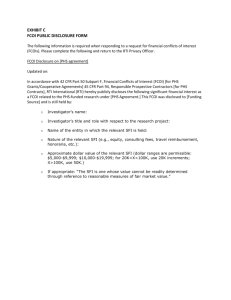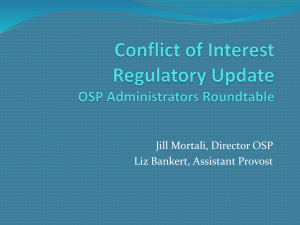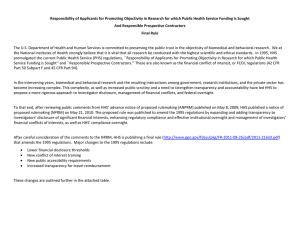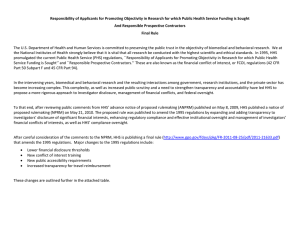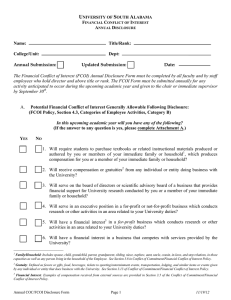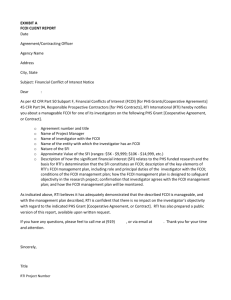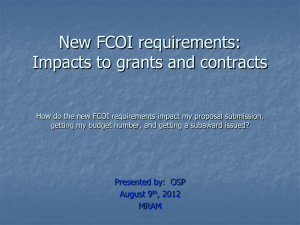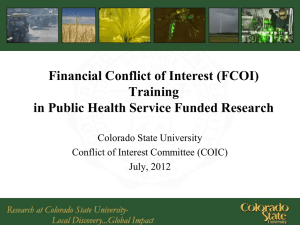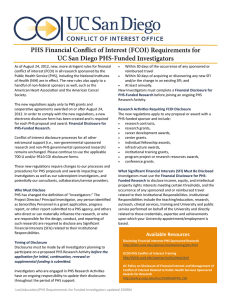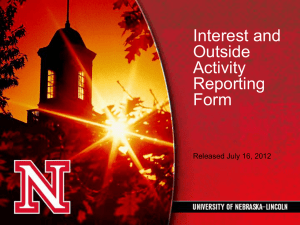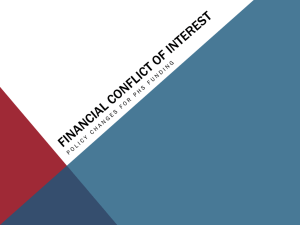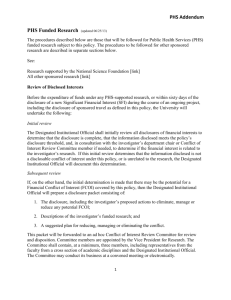Financial conflicts of interest
advertisement
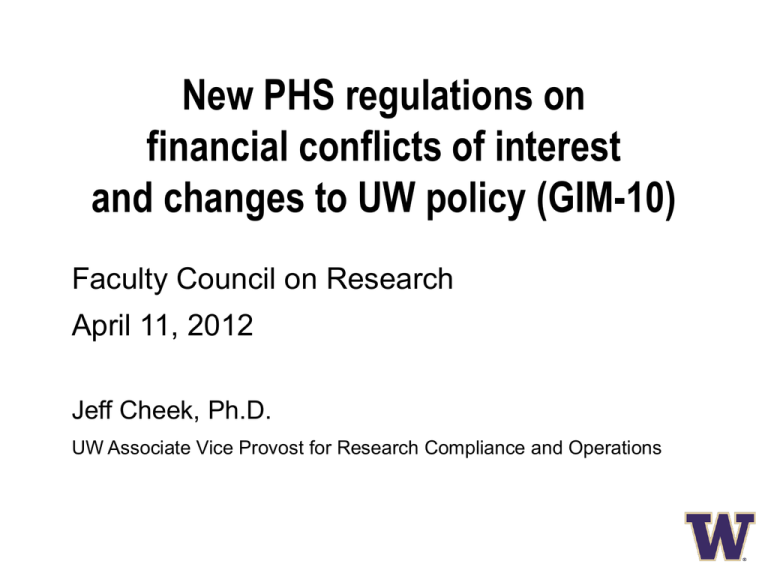
New PHS regulations on financial conflicts of interest and changes to UW policy (GIM-10) Faculty Council on Research April 11, 2012 Jeff Cheek, Ph.D. UW Associate Vice Provost for Research Compliance and Operations Federal Research Standard Conflicts of financial interest occur “whenever financial considerations may have the potential to compromise or have the appearance of compromising an investigator’s professional judgment and independence in the design, conduct, or publication of research.” - US Public Health Service, 1995 Financial conflicts of interest (FCOI),either actual or potential, occur in all human processes and are not inherently “bad” if they are appropriately managed Most frequent examples of FCOI in research • Outside salary, honoraria, consulting fees • Compensation for speaking engagements • Stock, stock options, other ownership interests • Intellectual property rights (patents, licenses) • Imputed interests (spouse, etc.) UW Significant Financial Interest (SFI) Disclosure Policy (GIM-10) •Applies to all research (sponsored and unsponsored) and tech transfer license transactions •Addresses conflicts and appearances of conflicts – any SFI that could potentially bias research •Goal is to prevent – Bias in research Harm to human subjects Misuse of UW and state resources Violations of state ethics act UW SFI policy (GIM-10) SFI disclosure is required prior to participating in research or tech transfer activity; anyone having a significant financial interest related to the activity must disclose details Disclosures can occur: when research proposal (eGC-1) is submitted to OSP; when IRB application is submitted to HSD; when SFI arises during the course of research; or prior to concluding technology licensing transaction with C4C. What is a “significant” financial interest? 1. For a Clinical Trial, any Financial Interest. 2. For Human Subjects Research other than a Clinical Trial (i) any Financial Interest exceeding $5,000 in value, (ii) any Equity Interest; or (iii) any Intellectual Property Interest. 3. For all Research other than Human Subjects Research and all Technology Transfer Transactions, (i) any Financial Interest (including a Compensation Interest, an Equity Interest and an Intellectual Property Interest) exceeding $10,000 in value, or (ii) any Equity Interest representing more than a 5% ownership in any single entity. (PHS / NSF definitions) NOTE: New PHS regulations and definitions of FCOI will apply in August 2012 New PHS Rules on Financial Conflicts of Interest (FCOI) Institutions receiving federal funding must be in full compliance with all of the requirements by the earlier of: August 24, 2012; or upon making its revised institutional financial conflict of interest policy publicly accessible. In the interim, institutions should continue to comply with the 1995 regulations. Summary of Key PHS Changes (1) Lowers the minimum threshold from $10,000 to $5,000 for disclosure of compensation for services or equity interest in a publicly traded company, with a $0 threshold for disclosure of equity in a non-publicly traded company. (2) Requires investigators to disclose all significant financial interests related to their institutional responsibilities (rather than only those related to the PHS-funded research). Summary of Key PHS Changes (3) Increases the institution’s responsibilities regarding identifying significant financial interests related to PHSfunded research; managing financial conflicts of interests; federal reporting requirements, and ensuring sub-recipient compliance. (4) Requires public transparency of FCOI management plans by either publicly accessible website or written response to any requestor within 5 business days of request for institution’s financial conflict of interest policies and certain information regarding any key personnel whose significant financial interests are related to PHS-funded research. Most troublesome PHS Changes (5) Requires all “investigators” to complete mandatory training prior to engaging in research related to any PHS-funded grant or contract. Re-training required every 4 years. (6) PHS-funded investigators must disclose the occurrence of any reimbursed travel or sponsored travel related to institutional responsibilities (including purpose of trip, sponsor/organizer, destination, and duration); some exceptions are allowed. The institution must subsequently determine if any travel reimbursement constitutes a FCOI with respect the investigator’s PHS-funded research project(s). What will change for all UW investigators with respect to FCOI disclosure process? a) All UW investigators that have financial interests related to their research will be subject to the lower threshold of FCOI for disclosure requirements, regardless of sponsor (i.e., there will be a single standard to define FCOI) b) ORIS is developing an electronic disclosure process that will replace the current paper-based procedure, which will reduce the administrative burden for faculty disclosing FCOI related to research projects. Highest impact changes for PHS-funded investigators at UW a) All PHS-funded investigators will have to complete mandatory online training prior to engaging in PHSsponsored research as of August 24, 2012. UW aims to have online training (and centralized tracking of completion) available by June 2012. b) As of August 24, 2012, all investigators on PHS-funded grants will need to disclose all travel reimbursements paid directly to them by an outside entity (with a few exceptions); the online disclosure system currently in development will allow such disclosures (in addition to SFI disclosures). Where will we need help from UW P.I.s and department administrators? •Many investigators (e.g., postdocs, graduate students) are not included in Key Personnel at the time the proposal is submitted (i.e., not identified on the eGC-1) •We currently do not have any means to centrally track new personnel added on to ongoing PHS-funded projects. We thus are dependent on P.Is and departmental administrators to remind “new” investigators of the mandatory training requirement.
